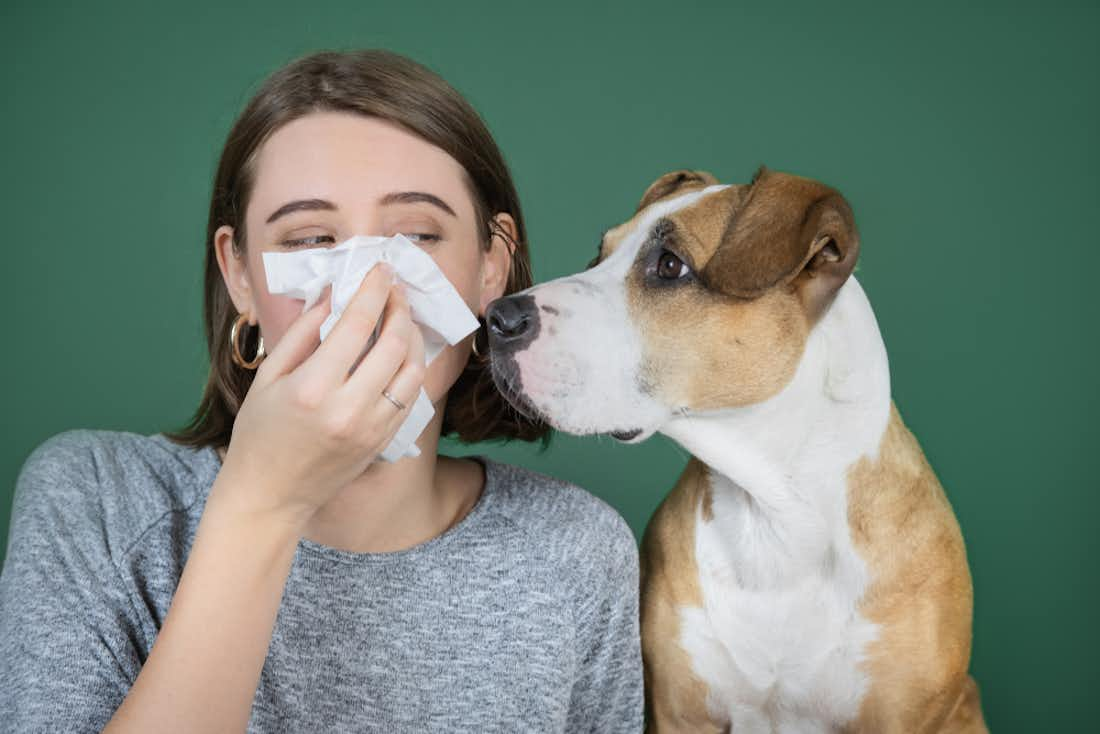Nov 11, 2021
Can You Develop Allergies Later In Life?
7 minute read
If you suffer from allergies, you know how tough it can be to manage your symptoms and focus on the rest of your life at the same time. Dealing with symptoms is always challenging; whether your allergies are seasonal, pet-related, or triggered by food or medication, dealing with symptoms is always challenging.
The struggle with allergies can start at any point in time – including adulthood. In this post, we’ll explain how and why allergies develop, as well as how to respond if you start suffering from symptoms later in life.
What Causes an Allergic Reaction?
An allergic reaction occurs when your immune system overreacts to exposure to a certain substance. This substance often referred to as an allergen, is usually something harmless like pollen, pet dander, or a specific food. However, when you ingest this allergen or breathe it in through your nose, your highly sensitive immune system perceives it as a threat to your health.
In an effort to protect your body from harm, your immune system releases chemicals called histamines when you’re exposed to an allergen. These chemicals regulate your body’s inflammatory response, which kicks in during an allergic reaction. Histamines play a major role in the symptoms that you might experience because of your allergies, which can range from mildly uncomfortable to severe and life-threatening.
Why Do Allergies Develop?
Your immune system, your body’s defense mechanism against illnesses, can produce specific antibodies to combat allergy symptoms. These antibodies are known as Immunoglobulin E, also known as IgE.
A person with a highly sensitive immune system is likely to produce more IgE in response to certain allergens, which can cause the symptoms associated with an allergic reaction. Everyone’s levels of antibodies like IgE are different; certain people have allergies, and others do not.
Who Gets Allergies?
Anyone can start suffering from allergies at any point in time. However, the earliest signs of an allergy typically show up in childhood. Allergies can sometimes even be diagnosed in infancy after a baby has an adverse reaction to a certain substance.
The main risk factor for developing allergies is heredity. That means that if someone in your family – your mother or father, for example – suffers from allergies, you’re more likely to deal with them yourself. However, other factors can increase your risk of developing allergies, including age, frequent exposure to specific allergens, and even your sex.
Types of Allergies
There are multiple types of allergies, and each variety requires a unique response and treatment strategy. Below, we’ll cover the two primary categories of allergies and their symptoms.
Seasonal Allergies
Seasonal allergies sometimes referred to as allergic rhinitis, typically cause symptoms during a specific time of year. People with allergic rhinitis have symptoms triggered by specific airborne allergens like tree or grass pollen, ragweed, dust mites, and more.
The symptoms of seasonal allergies can definitely be uncomfortable, but they aren’t life-threatening. If you suffer from allergic rhinitis, you’re likely to deal with a runny nose, sneeze frequently, have itchy or watery eyes, get a sore throat, and potentially experience sinus pressure or a headache from time to time.
Seasonal allergies can be diagnosed using either a blood test or a skin prick test, both of which can be administered by an allergist. With a blood test, a sample of your blood will be sent to a lab for analysis.
Then, the results from the lab will be analyzed by an allergist, who will determine what the cause of your symptoms are. During a skin prick test, your doctor will expose you to small amounts of common allergens, looking to see if any of them cause a visible reaction.
Adult-onset seasonal allergies sometimes develop in a person’s 20s or 30s. After this point, the risk of developing new allergies lowers significantly. However, you might start dealing with new allergy symptoms if you move to a new place where you are exposed to allergens that were not present where you previously lived.
Food and Medication Allergies
While seasonal allergies can cause symptoms when you breathe in airborne allergens, allergies to food and medication usually only trigger a reaction when you ingest the substance that you are allergic to.
Some of the most common food allergy triggers are:
- Shellfish
- Peanuts
- Tree Nuts
- Dairy
- Wheat
Medications that many people are allergic to include:
- Certain Antibiotics
- NSAIDs (Non-Steroidal Anti-Inflammatory Drugs)
While allergies to these substances are more common, you can be allergic to virtually any food or medication.
Allergies to food or medication can develop at virtually any point in your life. However, as is the case with seasonal allergies, you’re more likely to experience symptoms in childhood than to have your first reaction later in life.
Unlike seasonal allergies, reactions caused by food or medication can sometimes be life-threatening. The most severe type of allergic reaction is called anaphylaxis, and it can cause symptoms like swelling, trouble breathing, hives, and rashes.
Suppose a person is diagnosed with severe allergies to medication or food. In that case, their doctor will most likely prescribe them a shot of auto-injectable epinephrine, which can be used in the event of an anaphylactic reaction.
Types of Allergy Treatments
Once you’ve been diagnosed with allergies, you’ll have several options for how to tackle and manage your symptoms. Depending on the severity and causes of your allergies, your doctor or allergist may make a specific treatment recommendation. However, it’s up to you to determine which treatment is right for you.
Below are some of the most common treatments for allergies.
Antihistamines
These common allergy relief medications help to reduce the amount of histamine generated by your immune system. Since histamine is the primary chemical that contributes to the symptoms of an allergic reaction, taking an antihistamine can often provide you relief after you’ve been exposed to your allergy triggers.
Antihistamines can be either over-the-counter (available without a prescription) or prescription-only. Prescription allergy medication is typically more potent, and it is often recommended for sufferers of severe symptoms.
While antihistamines are often an ideal treatment for symptoms of seasonal allergies, they’re usually not powerful enough to manage a reaction caused by food or medication. In many cases, a person with this type of allergy needs epinephrine to get relief from the symptoms of a reaction.
Immunotherapy
This type of allergy treatment involves exposing your immune system to small amounts of your allergy triggers, slowly lowering your sensitivity to them. Over time, consistent immunotherapy treatments can reduce the severity of your symptoms, sometimes even eliminating the need for medications like antihistamines.
There are two types of immunotherapy: sublingual and subcutaneous. Sublingual immunotherapy treatments are typically either drops placed under the tongue or tablets that can be placed under the tongue. These medications can be taken at home without the supervision of an allergist.
On the other hand, subcutaneous immunotherapy needs to be administered by an allergist in-office, making treatment more time commitment. Also known as allergy shots, subcutaneous immunotherapy is often recommended for allergy sufferers dealing with severe symptoms that aren’t responding to other treatment methods.
Both forms of immunotherapy are highly effective for the treatment of seasonal allergies. However, immunotherapy isn’t typically used to manage or treat allergies to food or medication. These allergies tend to be lifelong, with the primary treatment strategy being avoiding the triggering substances.
Do Allergies Ever Go Away?
In the same way that allergies can seemingly appear out of nowhere at any point, they also have the potential to go away on their own. In some cases, food allergies that a person has suffered from since birth may start to disappear as that person reaches adulthood.
This is often the case with allergies to dairy, eggs, and soy. However, allergies to other foods like peanuts, tree nuts, fish, and shellfish typically last for life, as do most allergies to medications.
As for seasonal allergies, the best way to get your symptoms to go away is to commit to a treatment like immunotherapy. Your seasonal allergy symptoms can become much more manageable with consistent treatment, especially if you pair your medication with supplements and healthy habits.
In addition to seeking a treatment method that works for you, one of the best ways to find relief from your allergies is to do whatever you can to avoid their triggers. If you suffer from allergic rhinitis, this might be as simple as:
- Closing your windows during pollen season
- Washing sheets and other linens frequently
- Bathing your pets to minimize dander and other allergens
- Using a HEPA filter in your home or investing in an air purifier
Conclusion
If you’ve recently started suffering from allergies and don’t know what to do, we’re here to help. You can start by booking an online consultation with one of our allergists. From there, we’ll get you started on the path to an allergy-free life.
Sources:



